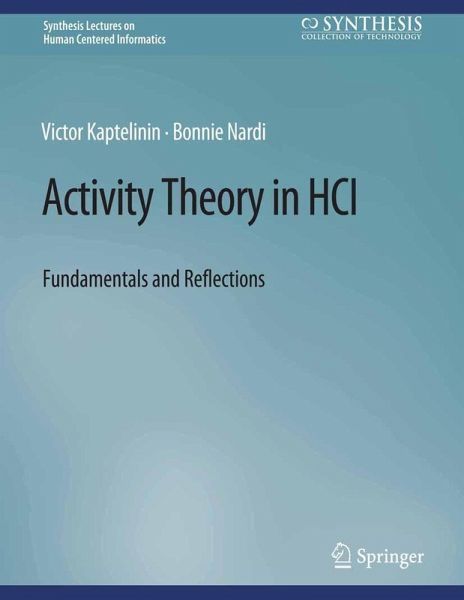
Activity Theory in HCI (eBook, PDF)
Fundamentals and Reflections
Versandkostenfrei!
Sofort per Download lieferbar
Statt: 32,09 €**
24,95 €
inkl. MwSt.
**Preis der gedruckten Ausgabe (Broschiertes Buch)
Alle Infos zum eBook verschenkenWeitere Ausgaben:

PAYBACK Punkte
12 °P sammeln!
Activity theory -- a conceptual framework originally developed by Aleksei Leontiev -- has its roots in the socio-cultural tradition in Russian psychology. The foundational concept of the theory is human activity, which is understood as purposeful, mediated, and transformative interaction between human beings and the world. Since the early 1990s, activity theory has been a visible landmark in the theoretical landscape of Human-Computer Interaction (HCI). Along with some other frameworks, such as distributed cognition and phenomenology, it established itself as a leading post-cognitivist approac...
Activity theory -- a conceptual framework originally developed by Aleksei Leontiev -- has its roots in the socio-cultural tradition in Russian psychology. The foundational concept of the theory is human activity, which is understood as purposeful, mediated, and transformative interaction between human beings and the world. Since the early 1990s, activity theory has been a visible landmark in the theoretical landscape of Human-Computer Interaction (HCI). Along with some other frameworks, such as distributed cognition and phenomenology, it established itself as a leading post-cognitivist approach in HCI and interaction design. In this book we discuss the conceptual foundations of activity theory and its contribution to HCI research. After making the case for theory in HCI and briefly discussing the contribution of activity theory to the field (Chapter One) we introduce the historical roots, main ideas, and principles of activity theory (Chapter Two). After that we present in-depth analyses of three issues which we consider of special importance to current developments in HCI and interaction design, namely: agency (Chapter Three), experience (Chapter Four), and activity-centric computing (Chapter Five). We conclude the book with reflections on challenges and prospects for further development of activity theory in HCI (Chapter Six). Table of Contents: Introduction: Activity theory and the changing face of HCI / Basic concepts and principles of activity theory / Agency / Activity and experience / Activity-centric computing / Activity theory and the development of HCI
Dieser Download kann aus rechtlichen Gründen nur mit Rechnungsadresse in A, B, BG, CY, CZ, D, DK, EW, E, FIN, F, GR, HR, H, IRL, I, LT, L, LR, M, NL, PL, P, R, S, SLO, SK ausgeliefert werden.












